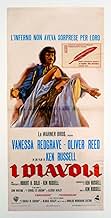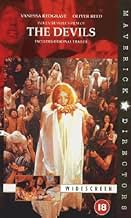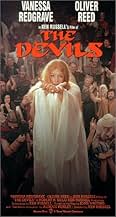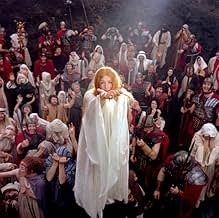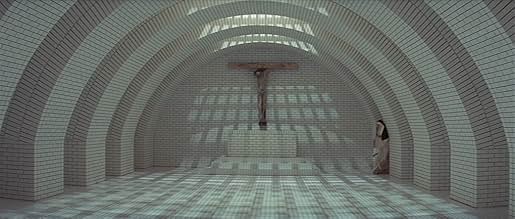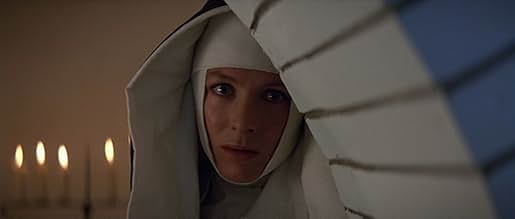Na França do século XVII, o Padre Urbain procurou proteger a cidade de Loudun do estabelecimento corrupto do Cardeal Richelieu. A histeria ocorre dentro da cidade quando ele é acusado de bru... Ler tudoNa França do século XVII, o Padre Urbain procurou proteger a cidade de Loudun do estabelecimento corrupto do Cardeal Richelieu. A histeria ocorre dentro da cidade quando ele é acusado de bruxaria por uma freira sexualmente reprimida.Na França do século XVII, o Padre Urbain procurou proteger a cidade de Loudun do estabelecimento corrupto do Cardeal Richelieu. A histeria ocorre dentro da cidade quando ele é acusado de bruxaria por uma freira sexualmente reprimida.
- Prêmios
- 4 vitórias no total
Izabella Telezynska
- Sister Iza
- (as Iza Teller)
Tony Allen
- Spectator
- (não creditado)
- Direção
- Roteiristas
- Elenco e equipe completos
- Produção, bilheteria e muito mais no IMDbPro
Enredo
Você sabia?
- CuriosidadesA major sequence in which the nuns tear down and ravish a life-sized icon of Christ in an orgiastic frenzy was cut from the film and subsequently vanished. Film critic Mark Kermode discovered the footage many years later. Ken Russell was keen to reinstate the scene but found that Warner Brothers were not interested in doing a director's cut. The footage can be seen in a documentary Kermode made about Russell and was subsequently included in an uncut DVD release.
- Erros de gravaçãoEarly in the movie when Urbain Grandier (Oliver Reed) is seen grooming his hair. It is a close-up of him supposedly looking at a mirror in the upper left hand corner of the screen, behind the viewer. Obviously there is no mirror as he consistently misses combing the more egregiously messed up parts of his hair and instead repeatedly combs the portions that are already groomed. In fact when he is done, his hair is still messed up.
- Cenas durante ou pós-créditosAt the start of the film: "This film is based upon historical fact. The principal characters lived and the major events in the film actually took place."
- Versões alternativasIn 2012 the BFI persuaded Warners to allow them to release the film on video in the UK. Warners refused to allow the director's cut at all and would only allow the BFI to release the original 'X' certificate version on DVD. Warners refused permission to allow a hi rez release. The BFI produced a superb DVD transfer for the first time in its proper 2.35:1 ratio. The Channel 4 documentary 'Hell on Earth' was included but the 'Rape of Christ' sequence was removed. They also cut a line of dialogue when one of the actors refers to Warners as a bunch of 'c**ts'. Before this in the USA the 'unrated' version appeared as an upcoming release complete with sleeve art. 24 hours later Warners stopped the release!
- ConexõesFeatured in Omnibus: Russell's Progress (1971)
- Trilhas sonorasBourrée d'Avignon
from Secretum musarum (1615)
Music by Nicolas Vallet.
Played as the king's dance in the opening.
Avaliação em destaque
British director Ken Russell's adaption of Aldous Huxley's book "The Devils of Loudun" is one of the most origional, controversial and daring films ever made. The film takes place in 17th-century France and centres on the hypocritical and licentious behaviour of debauched priest Father Urbain Grandier, brilliantly played by Oliver Reed. A second plot strand involves the humpbacked nunn Sister Jeanne, played by Vanessa Redgrave, who, along with her fellow nuns, is obsessed with Grandier. When the nuns become seemingly possessed, disgruntled representatives of the Catholic Church and corrupt officials move in and seize their opportunity to get rid of Grandier.
The film gets off to an excellent start, gradually building up the tension and highlighting the flaws within the Catholic religion. However the middle section involving the possession of the nuns is far too theatrical and over-the-top and the action becomes weighed down by the overbearing performance of Michael Gothard as Father Barre and Derek Jarman's lurid sets. The final section of the film, however, is mightily impressive and well-scripted and benefits hugely from Oliver Reed's committed performance.
While Vanessa Redgrave impresses in the role of Sister Jeanne this is Oliver Reed's film and a performance which proves he was a great actor and not just a great hellraiser. This film illustrates that he is easily the equal of his contemporaries including Caine, Connery, Harris and Finney.
While director Ken Russell's films can range from the very good to the absolutely awful "The Devils" is without doubt his best. This is perfect material for Russell to work with and the ideal outlet for his unique vision. Russell was part of the new breed of controversial directors who emerged in the late 1960s and 1970s who courted controversy with images of sex, nudity, violence and shocking images. "The Devils" is no exception and while it will by no means be to everyone's taste it should be commended for its daring take on the hypocritical side to religion and for helping to pave new ground in cinema.
The film gets off to an excellent start, gradually building up the tension and highlighting the flaws within the Catholic religion. However the middle section involving the possession of the nuns is far too theatrical and over-the-top and the action becomes weighed down by the overbearing performance of Michael Gothard as Father Barre and Derek Jarman's lurid sets. The final section of the film, however, is mightily impressive and well-scripted and benefits hugely from Oliver Reed's committed performance.
While Vanessa Redgrave impresses in the role of Sister Jeanne this is Oliver Reed's film and a performance which proves he was a great actor and not just a great hellraiser. This film illustrates that he is easily the equal of his contemporaries including Caine, Connery, Harris and Finney.
While director Ken Russell's films can range from the very good to the absolutely awful "The Devils" is without doubt his best. This is perfect material for Russell to work with and the ideal outlet for his unique vision. Russell was part of the new breed of controversial directors who emerged in the late 1960s and 1970s who courted controversy with images of sex, nudity, violence and shocking images. "The Devils" is no exception and while it will by no means be to everyone's taste it should be commended for its daring take on the hypocritical side to religion and for helping to pave new ground in cinema.
- shotguntom
- 13 de abr. de 2002
- Link permanente
Principais escolhas
Faça login para avaliar e ver a lista de recomendações personalizadas
- How long is The Devils?Fornecido pela Alexa
Detalhes
- Data de lançamento
- Países de origem
- Idiomas
- Também conhecido como
- Los demonios
- Locações de filme
- Empresa de produção
- Consulte mais créditos da empresa na IMDbPro
Bilheteria
- Faturamento bruto mundial
- US$ 2.293
- Tempo de duração1 hora 51 minutos
- Mixagem de som
- Proporção
- 2.35 : 1
Contribua para esta página
Sugerir uma alteração ou adicionar conteúdo ausente


![Trailer [EN]](https://m.media-amazon.com/images/M/MV5BYjgxZTMwNzYtYmE4Zi00ZDNjLWJkZjUtNTQ1NGQ1ZWRmMDAwXkEyXkFqcGdeQXRyYW5zY29kZS13b3JrZmxvdw@@._V1_QL75_UX500_CR0)

